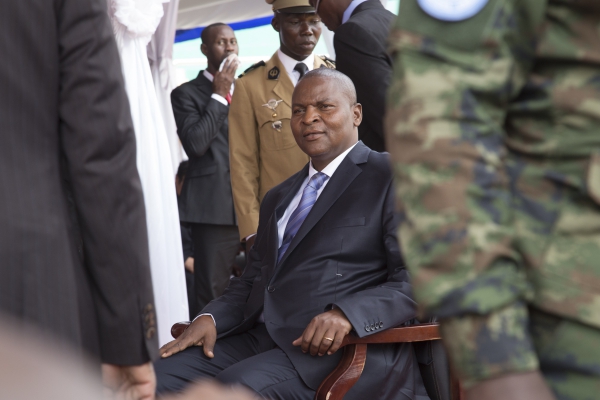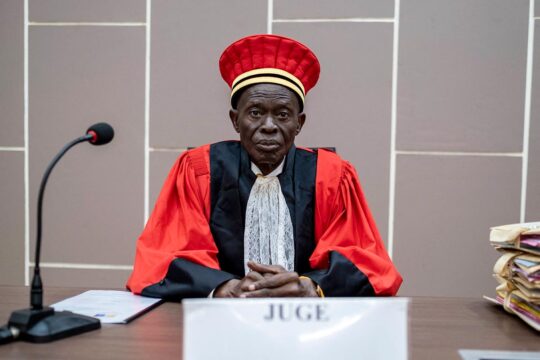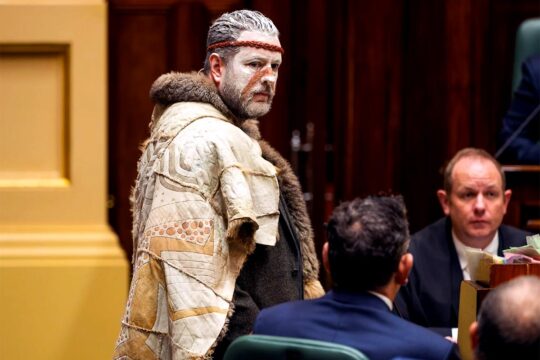Didier Niewiadowski is a French jurist and former advisor at the French embassy in Bangui (2008-2012). In an interview with JusticeInfo last June, he urged the new president of the Central African Republic Faustin Archange Touadéra to quickly set up a transitional justice process. Today he is disillusioned. He thinks the new government has shelved transitional justice. He points to the fact that warlords of the ex-Séléka* continue to roam free abusing civilians, and to the recent conditional release of former Defence Minister Jean-Francis Bozizé, son of the ex-president **.
JusticeInfo: How do you see the conditional release of Jean-Francis Bozizé at a time when Central Africans want justice?
Didier Niewiadowski: His conditional release is a joke which does not make Central Africans laugh. Didn’t the country’s prosecutor issue an arrest warrant for him on May 14, 2014 on very serious charges? We should also remember that the warlords of the ex-Séléka circulate freely although there are arrest warrants for them too, since they have victimized innumerable Central Africans. Don’t let us forget that nearly a million Central African refugees and displaced people are living under canvas in the greatest hardship.
JusticeInfo: So you think the new government is not in a hurry to launch a transitional justice process ?
DN: President Faustin-Archange Touadera and Prime Minister Mathieu Simplice Sarandji do not seem much aware of the benefits of transitional justice. The only thing that counts is possible funding for seminars and other sensitization initiatives linked to it. In the CAR everyone is more or less involved in embezzlement, falsification, corruption and so on. Impunity is the condition for political survival, since sooner or later you will be caught. As usual, only the small fry will be handed over to the justice system. By the same token, no political personality from the Transition will be troubled, let alone from the period of the Bozizé presidency, since many people who were in that autocratic and corrupt regime are now back in government.
JusticeInfo: So what could be the consequences for President Touadera himself and for the Central African Republic?
DN: When he was Prime Minister under Bozizé (2008-2013), Touadera was strongly under the influence of Sylvain Ndoutingai, Minister of State and nephew of the president, and of course the Bozizé clan. Touadera is a man who has a sense of the public interest, modest and not so much interested in money. He is above all an academic who is a bit lost in this wheeler-dealing world that is the Central African Republic. The Central Africans elected him knowing what they were doing. Unfortunately he has bad advisors and the people he nominated to the cabinet and government are hardly compatible with his slogan "breaking with the past." The Central Africans are disappointed and have the impression they’ve been taken for a ride. It’s like Bozizé again without Bozizé. It could finish the same way.
JusticeInfo: A donor round table is due to take place in November on the Disarmament, Demobilization, Reintegration and Repatriation (DDRR) programme in the CAR. Do you think potential donors may be hesitant because of this lack of concrete steps on transitional justice?
DN: The Central African government puts the cost of the DDRR programme at 45 billion CFA francs. The bill will be presented in Brussels in November at the roundtable. In the CAR, everything starts over without taking account of the past. This will be the third roundtable in Brussels. Most of the Central African participants have taken part before. On the other hand, experts and international diplomats are discovering the CAR’s problems for the first time. So they are sensitive to the arguments presented. Diplomatic missions should make sure they have good archives so they are not fooled by politicians who always get back into power despite their past.
The government will present the things the donors want to hear. It’s enough for the government to know the donor demands and it will adapt. So it will present the budget as the IMF wants. For example by reactivating a Court of Audit abandoned for years to prosecute an illusory 2011 transition election commission, whereas the independent electoral commission of 2010 is not held accountable. Or probing into a 2011 High Council of Communication whose president is dead. They are playing to the gallery, but the donors bite the bait every time. They will jail a poor little civil servant to great media fanfare whilst the minister won’t be touched. That’s how it has always been in the Central African Republic.
JusticeInfo: Are transitional justice and DDRR closely linked in the Central African Republic, as some people say? Can one succeed if the other fails?
DN: Despite the obvious potential benefits of setting up transitional justice mechanisms, I don’t think the current government envisages for a moment doing this. In the same way, DDRR is a ridiculously complex machine invented by UN technocrats in air-conditioned New York offices. It is taken up by retired soldiers, often generals, who see interesting opportunities, especially as the sums of money involved are considerable. Do you think the warlords, often foreigners, who reign over the mines and the local population are going to give up their nice lives to go back to their villages for sums of money, or for low level integration into the army? I am very doubtful about these technocratic programmes, and I am afraid that the CAR will continue its inexorable falling apart, with the country carved up into a multitude of fiefdoms. Like in Somalia, the UN-recognized government’s power will cover about km2 in the capital and its members will be based in a few heavily protected big hotels. The current government in Bangui hardly controls a quarter of the country. How is it supposed to implement DDRR in the other three-quarters?
JusticeInfo: What can be done to stop the CAR becoming like Somalia?
DN: Unfortunately the Constitution does not really enable us to envisage a resolution to the crisis. It was drawn up rather amateurishly with no real will to change governance, and adopted by referendum in the greatest opacity in December 2015, just a few days before the presidential and legislative elections. I do not think the creation of a Senate and an exact copy of the French Constitution will be able to give renewed hope to the population. What was needed was to reduce central powers and introduce real decentralization, abolish election of the president by universal suffrage to create a form of parliamentary governance, restore the political and administrative authority of the traditional chiefs, give absolute priority to education and not to the army, and outlaw corrupt politicians by making them ineligible for all political and administrative elected positions.
* Séléka is a rebel coalition that chased President François Bozizé from power in March 2013 and which is linked to mass atrocities against the population. The Séléka were fought by the Antibalaka self-defence militia who in turn committed serious abuses.
**Jean-Francis Bozizé is charged in connection with embezzlement of public funds and acts of violence perpetrated in 2013 when his father, ex-president François Bozizé, was ousted. After three years in exile in Kenya, Bozizé the younger presented himself in early August to the UN Mission in the CAR, which handed him over to the Central African authorities. They granted him conditional release.







